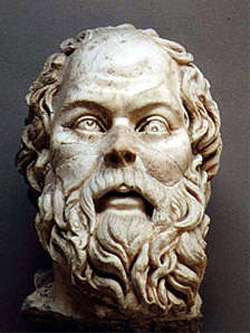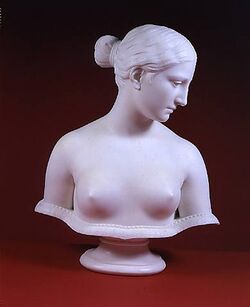Idiocrates
“My advice to you is to get married: if you find a good wife, you'll be happy; if you get a bad one, you'll become a philosopher.”
“Who needs Plato's Cratylus, when you have Idiocrates'”
Idiocrates (full name: άτομο με έναν μικρό εγκέφαλο αλλά ένα μεγάλο πέος) was a Greek scientist and philosopher of the early 5th century B.C.E. He is mostly renowned for inventing the first Idiotic Table of the Elements in 430, as well as his highly observationist method of philosophy. Often mistaken for his teacher and mentor Idiosyncrasies (despite the well defined individual differences between them), Idiocrates founded the Stoic School of Idiocracy.
Early life
Idiocrates was born in 460 B.C.E in the village of Obvios in southern Greece. Surviving records indicate that he was a particularly unattractive child, sporting a bald head and long white beard by the age of 4. By the age of 10 he was already gathering small audiences to hear him speak. Most of his early proclamations are lost, but it is generally accepted that it was around this time he started to notice the relationship between the elements, on one famous occasion proclaiming: "Stuff can be like...hard, y'know? But then there's wind n' shit too."
When Idiocrates reached the age of 15, it is known that he became a goth for a short period, dyeing his beard black, and stating "Fuck all that philosophy shit". Happily for science's sake, he appears to have grown out of this phase by 436, when at the age of 24 he published the essay Is stuff made from other stuff? This tablet outlined his philosophy and was to form the basis of the development of the Idiotic Table of the Elements.
Philosophical development
In Is stuff made from other stuff?, Idiocrates outlined the hitherto-unexplored concept that all matter was either made up of smaller bits of matter, or was a small bit of matter that had accidentally come apart from a larger bit due to the divine will of the Gods. He also proposed the theory that matter (which he preferred to refer to as "stuff") could exist in different states: Lumpy, Splashy, Breezy and Burny, and that it could be combined, e.g.:
The revelation that "stuff" wasn't just "shit that was left lying around" quickly spread throughout the Greek Empire, and Idiocrates received substantial funding to continue his work. Over the next six years, Idiocrates and his team conducted extensive field tests of different kinds of stuff, and concluded:
They published their findings in 430 as The Idiotic Table of the Elements, firmly dividing all known stuff into four distinct elemental forms:
| Flaemon | Wettium | Windon | Dirtium |
|---|---|---|---|
| Fire, cigars, barbecues, etc. |
Streams, urine, beer, etc. |
Draughts, smoke, farts, etc. |
Everything else |
However, the theory that Idiocrates and his assistants proposed in their table was not without its skeptics. The Roman mathematician Moronicus wrote: "('Idiocrates')... would have us believe that water and dirt comprise two separate elements... well, what about mud then, Mr. Smarty-Pants?"
To which Idiocrates replied: "What about your MOM!" Thus thoroughly shutting Moronicus the fuck up.
Idiocratic Method
The Idiocratic Method was a method of philosophical inquiry invented by Idiocrates, and originally used extensively in his attempts to convince others of his theory of matter. Idiocrates would first present a ground-breaking thesis, for instance, "All things are made out of stuff". When his interlocutors presented a counter-argument, Idiocrates would respond with sophisticated arguments, such as "Yeah? So what?", rhetorical questions such as "I know you are, but what am I?" or subtle but brilliant logical arguments, for instance, "Oh yeah, well this is you: 'Duh, I'm not listening to Idiocrates 'cause I'm a stupidhead.'" The Idiocratic Method also made intensive use of contradiction by first propounding an argument and then immediately contradicting it with his next statement, so that his opponent could not properly identify his stand so as to establish counterarguments. His opponents finally became so frustrated and exhausted to the point that they confronted the leadership of the state to get him executed for "being such a pain in the πρωκτική περιοχή" (the last part of the expression is according to linguist experts impossible to translate in a proper manner).
Later life
As the years passed, his theorem grew widely accepted throughout most of Europe. Idiocrates continued researching the properties of the four 'elements' until he was arrested for attempted arson in 423. After serving a short custodial sentence, he retired from the sciences, and devoted his remaining years to establishing a homoerotic theatre company called "My stuff 'n yur stuff".
Death
In 1406 the complaints that had been voiced against him by his angered opponents finally filtered their way through the Greek bureaucracy. Having no particularly shocking cases to work with at the time, the high court chose to use this case to demonstrate that they were still vital and worthy of their togas.
Idiocrates was sentenced to death for public annoyment and ordered to take his life with poison. He refused the verdict, saying that the court had no divine right to chose his day of death, just to pronounce the fact that he was lethal. After his refusal to meet death by his own hands, the court decreed that Idiocrates was to be tied between four horses and torn limb-from-limb; however, before he could be tied up he emitted such a series of girlish shrieks that he scared the horses into bolting. An attempt to decapitate him also failed when he soiled himself on the stand with such vigour that the executioner slipped and fell.
According to Greek law, two consecutive failed executions signified that the Gods wished this individual to be spared, and so Idiocrates was exiled to the island of Lesbos and left to die in (somewhat comfortable) disgrace, which he did at the healthy age of 98 some thirty years after the failed execution attempts.
Afterwords
The legacy of Idiocrates extends far beyond his theorem: the leading lights and illuminaries of our modern era consider him to be the instigator of our study of the universe, inspiring Sir Isaac "apple fall down" Newton to proclaim Idiocrates as the "Father of Modern Science" (though he later retracted this and made the claim for himself, relegating Idiocrates to the status of "funny great-uncle by marriage of Modern Science"). The founding (and subsequent fall) of the nation-state Geece can be traced directly to his influence.
The Idiotic Table today
It is well known that after Idiocrates' death, many eminent scientists expanded upon his theories to develop the current Idiotic Table of the Elements, a comprehensive table of all known elements. Whilst it has been subsequently proven that matter is made up of smaller elemental particles than Idiocrates originally proposed, nonetheless his theories still form the building blocks of all contemporary science.
Influences on philosophy and sciences
- Mediocrates. Famed - well, moderately well known - for his middle-of-the-road, not particularly good philosophy.
- Aristocratle. Aristocratle was responsible for the dirtiest joke in the world, which involved a family of Thebans auditioning their variety act for a Spartan talent agent. Fortunately, the joke perished in the fire at the Library of Alexandria.
- Marcus Stupidicus. Roman stoic philosopher and Emperor, known far and wide for his stupidity.
- Juvenile. Founder of the Urinal Wall School of Philosophy
- Confuzus. Founder of the East Asian philosophy of D'ohism.
- René Decretin. Responsible for the saying, "Cogito, ergo sumthinorother" (I think, therefore... something or other").
- Ludwig Witlesstein. Famed for his Theory of Mindlessness.
- Johann Wolfgang von Gitte. Created the "Selfish" Interpretation of Materialism.
| Featured version: 17 June 2006 | |
| This article has been featured on the main page. — You can vote for or nominate your favourite articles at Uncyclopedia:VFH. | |









